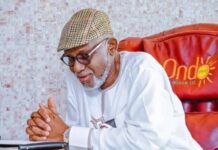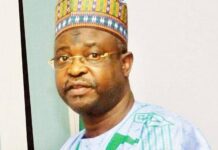By Chris Paul Otaigbe
In preparation for the Golden Jubilee anniversary of the founding of Lagos State, the drivers of that 50th Anniversary met none other than the man who can be aptly described as the founding father of modern Lagos , the first Military Governor of Lagos State, General Mobolaji Johnson and he told them the story behind the making of a modern city State.
“When we got Lagos, it was a cosmopolitan city. We had it at a stage of development that I felt we had to develop it further to meet the yearning of the 21st century of the people of Lagos.
We began with building Eko bridge and went on to build more infrastructure depending on what area of life of the people you want to touch on. We took the bull by the horn.
We set up management boards to look into their welfare. We built houses and even set up Housing Tribunals so you can take your Landlord there. We upgraded the standard of teaching to ensure that Teachers get promoted on their own achievements too.” The retired Army officer said.
That was how committed, to the job of governing a cosmopolitan city as Lagos, General Mobolaji Johnson was as the first Governor of Lagos State.”
Clearly, Johnson saw his assignment as Military Governor for the new State, Nigeria’s tiniest, beyond a mere administrative duty to keep peace and encourage development in the nation’s Federal capital territory at the time.
He saw it, quickly, as an opportunity to apply his visionary ideas to ensure he developed the State beyond the point he met it, and he did.
It is understandable that the heartfelt tribute of the current Governor of the State, Babajide Sanwo-Olu was a salute to Johnson’s visionary management of the affairs and development of the State. He became Governor, two years (June 25, 1965) after the birth of Sanwo-Olu, in 1967.
In other words, Sanwo-Olu was a toddler in Lagos bouncing around the house, at two years, when Mobolaji was being sworn in and when the Late General swung into action setting up the Lagos, this current Governor grew up to meet. By the time Mobolaji left office as Governor, Sanwo-Olu was ten years old. Looking back now, the current Governor, would perhaps be in his third or fourth class in Primary school.
Perhaps, he may have been one of those who qualified in the highly competitive school Team that were sent to join other schools at Race Course to wave flags at and marched pass the Governor on Independence Days. An engagement every pupil or student did with great pride.
The Johnson era in Lagos State was happened in a Yakubu Gowon Nigeria when Nigeria was the place to be in the world. A time when Lagos was the center and symbol of Africa’s paradise. It was a time, when to be a Nigerian was something to be truly proud about and to live in Lagos was every Nigerian’s dream. Lagos was the place to be.
That was because Johnson brought not just visionary leadership to bear on the State, he also brought the ‘Lagos Boy’ and swag that fired up the loyalty of the Lagosian to the spirit and essence of Lagos.
So, when Sanwo-Olu said ‘‘Although Gen. Mobolaji Johnson has gone to be with his Lord and creator, the memories of great accomplishments he left behind will linger on forever…”
It came from his heart. Same sentiments apply to tens of millions of those who were born from the mid-60s to early 70s because it was the best Lagos we remember till date.
Like millions of us, he remembers how the late Gen. Johnson’s administration worked with other seasoned professionals to establish five Government Colleges and Housing estates, which were commissioned by the then Head of State, Gen. Yakubu Gowon, within one year of his administration. This, to me, is the hallmark of service and has remained a benchmark for successive administrations in the state.’
Gen Johnson was a man of vision with a mission to see a modern Lagos evolve, whether the vision he birthed is manifesting in what we see today, is what many a Lagosian keeps wondering as they continually live in a Lagos that has dangerously become a frightening shadow of the Lagos Johnson left for the generations of his successors.
At best, every successive administration strives to build on the developmental structure and foundation of good governance laid by late General.
In the current Lagos where governance has turned into an enterprise of sort where the wealth and properties of the State find their way into private pockets and a situation in which State officials, from the highest to the mid-level civil servants own a chunk or half of the State, the moral legacy Gen. Johnson laid down dwarfs over 99% of those who became Governor of the State, after he left the State House.
At the inception of the Gen. Murtala Mohammed administration in 1975, Sanwo-Olu said Mobolaji Johnson was one of the two state governors that was found not guilty of corruption by the three-man panel commissioned to investigate the various allegations of corruption among state governors.
In his condolence message, President Mohammadu Buhari acknowledged his contributions to the development of Lagos state and affirmed that Johnson laid a solid foundation for it.
Buhari should know because he also joined the Nigerian Army around the period the former governor, joined the nation’s military. So, he knows what he is saying when he said Johnson had a distinguished career in the Nigerian Army, starting out as a cadet in 1959 and retiring in 1975.
As one who participated in the 1966 counter coup that overthrew Nigeria’s first self-appointed Head of State, General Aguiyi Ironsi, and brought in the Yakubu Gowon regime in which Johnson served as Governor, Buhari who was also a military Officer assigned to one of the States in the North East at the time, knows that Gen. Johnson provided a good framework for the civil service in Lagos.
Considering the state of basic infrastructure and amenities in the State today, the President noted that the late Johnson’s footprints in promoting education and building durable healthcare system will always be remembered.
That is why Buhari anxiously called on all leaders of the state and citizens to uphold the legacies of discipline and selfless service bequeathed by Brig.-Gen Johnson.
Early life
Johnson was born to the family of Joshua Motola Johnson and his wife, Gbemisola Johnson
(née Dudley-Coker). His father was of Egba heritage and a member of the Royal West African Frontier Force during World War II.
His grandfather’s last name was previously Osholero but he changed it to Johnson after the priest who converted him to Christianity. The Johnson family moved to Lagos during the early parts of the twentieth century. Johnson had five other siblings including his brother, Femi Johnson, founder of Femi Johnson and Company at Ibadan.
Mobolaji Johnson started his education at Reagan Memorial Baptist School, Yaba, Methodist School in 1941. He then attended Hussey College, Warri, 1954. In 1955, he moved to Methodist Boys High School (MBHS) Lagos, the School his father attended, where he finished his secondary education in 1957.
While in MBHS, Lagos, Johnson was a good all-round sports man. His career in the military began in 1958 at the Military Depot, Zaria, where he was till 1959 before leaving for the Officer Cadet Training School in Ghana. Johnson also attended the Mons Officer Cadet School in Aldershot and the Royal Military Academy, Sandhurst, United Kingdom, between 1960–1961.
A member of the United Nations Peace Keeping Troops, Congo, Johnson was promoted to 2nd Lieutenant, Nigeria Army, 1961, Lieutenant, 1962, Captain, October 1962 and two years down the line he was appointed Deputy Commander, Federal Guards, 1964, Commander, Federal Guards, 1964 and Deputy Adjutant and Quartermaster-General Headquarters, 2nd Brigade, Apapa, Lagos, also in 1964.
He was a Major, February 1966, Second in command, 4th Battalion, Ibadan, and Station Commander, Benin, Midwest (old Bendel State).
At the end of the famed Biafra War, Johnson was amongst the federal delegates at the end of the war ceremony. After the abortive coup d’etat that put paid to the first Nigerian civilian administration, he became Military Administrator of Lagos State in 1967.
His headship of Lagos actually dated back a year earlier when he was appointed by Aguiyi-Ironsi as the administrator of the former federal territory of Lagos in 1966, because Ironsi, who was the head of state, wanted someone from Lagos to handle some of the problems of the federal territory.
In May 1967, Lagos State was created and Johnson became the first governor of Lagos; the state was now composed of the old Federal Territory of Victoria Island, Ikoyi and Lagos Island plus the additions of the Epe, Badagry, Ikorodu and Ikeja divisions.
He was involved in developing the civil service in the State. Johnson was initially assisted in running the state with help from some key civil servants such as Administrative Secretary, Adeyemi-Bero, Finance Secretary, Folarin Coker, and the acting secretary to the Military Government, Howson Wright and waited until April 1968 before appointing his commissioners.
Some of the infrastructure Mobolaji bequeathed Lagos included: 60.7-kilometre international express road (Lagos–Badagry Expressway) linking Nigeria with the neighboring countries Benin, Ghana and Togo, Toikin Bridge to link Epe to Ikorodu, Eko Bridge, Third Mainland Bridge, a network of roads and bridges that constitutes what is modern day Lagos, Reclamation of the Bar Beach shoreline.
Another coup ushered in a new military government in 1975. A new administration came in, under an anti-corruption banner.
According to the wise, no man is perfect, just as no administration can be 100% perfect. The Late General did have his own dark spot as manifested in his demolition of Ajele Cemetery.
Johnson’s administration was responsible for the demolition and disinterment of people buried at Ajele Cemetery such as Samuel Ajayi Crowther, James Pinson Labulo Davies, Madam Tinubu, Thomas Babington Macaulay, and many others.
The demolition met with a lot of criticism: Prof J.D.Y. Peele noted that the demolition had deprived “Lagosians not only of a precious green space in the heart of the city but of the memorials of their forebears.”
Nobel Laureate Wole Soyinka called the demolition “the violation of that ancestral place” noting that “the order came from the military governor [Mobolaji Johnson]: ‘Dig up those dead and forgotten ancestors and plant a modern council building – with all its lucrative corollaries on that somnolent spot.”
In 1975, at the inception of the General Murtala Mohammed administration Johnson was one of the two state Governors (along with Brigadier General Oluwole Rotimi) found not guilty of corruption by the three-man panel commissioned to investigate the various allegations of corruption amongst the State Governors.
General Johnson retired from the Nigerian Army in 1975 and went into private business. He had four children, three sons and a daughter.
Johnson was the Chairman of Nigerian Conservation Foundation and became a Director of construction giant Julius Berger Nigeria in 1979 and its chairman in 1996, a post he held until 2009.
Johnson was the Chairman, Executive Council of Lagos State University Development Foundation.
He was the Chairman of the Board of Trustees of Methodist Boys’ High School, Lagos Old Boys’ National Association. He was honored with the position because he was a distinguished Old Boy who was of great assistance to his Alma Mater.
A road, an avenue, and a sports complex in Johnson’s home state bear his name as well as a Housing Scheme at Lekki both in Lagos.
Clearly, Gen. Johnson had been the natural pick to build Lagos, not because he was a ‘son of the soil’ (which was Ironsi’s consideration for appointing him to head Lagos before it was created), but because his visionary spirit, as manifested in his persona flavored with the charm that only a typical (Omo Eko) ‘Lagos Boy’ carries, speaks to his greatness as a true builder and achiever.
One of Hollywood’s legends Late Frank Sinatra’s songs oldies hit ‘I did it my way’ rings through in the story of Gen. Mobolaji Olufunso Johnson and jolly well, he is right when he said it has worked for him.
“We look back at all we have done and say to ourselves that we put in our best to meet the yearning of the people…” Lagosians and indeed, all Nigerians and friends of Nigeria, the world over, who witnessed Johnson’s Lagos he was in charge, would not only agree but show gratitude to him for sowing and delivering a Lagos that should be… which, sadly, they can no longer see or feel…A Lagos that has receded to the mind just as memories of the great General that now lingers on, in honor of grandson of Osholero who became the Benevolent Leader and Father of modern Lagos.










